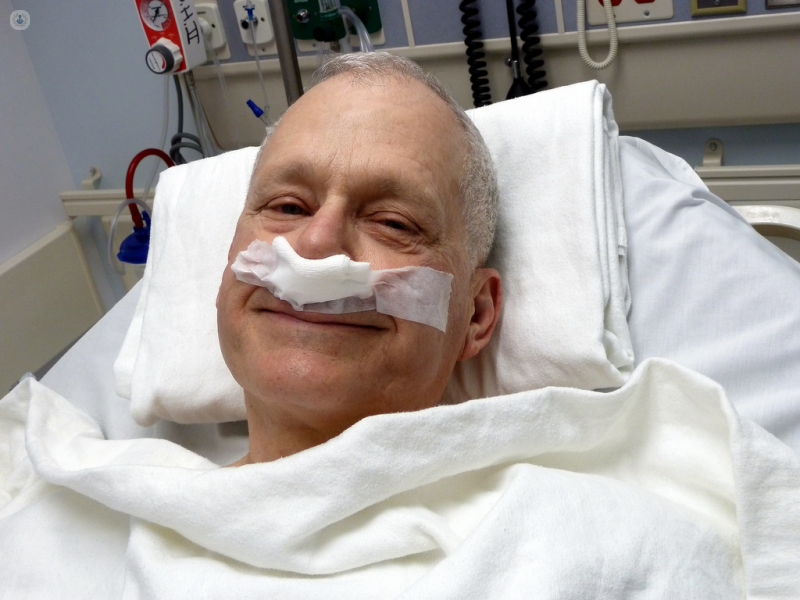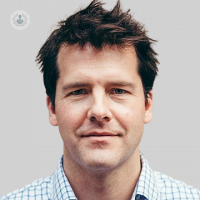Who needs sinus surgery?
Written by:The sinuses can be affected by a number of problems, but when is surgery needed? Leading ENT surgeon Mr Julian Hamann explains:

When is sinus surgery needed?
Sinus surgery is performed for many reasons. By far the most common reason is for people who have chronic or recurrent sinus infections, usually when medical treatment has failed.
Chronic sinusitis is not normally particularly painful. People with chronic sinus infections tend to have a blocked, congested nose, and often feel as if they have a permanent cold. A feeling of pressure in the face is common, and the sense of smell can be impaired. Some have mucus dripping down the back of the nose (post-nasal drip). Chronic sinusitis can often be treated medically, but if medicines don’t work, then sinus surgery is often curative.
Some patients with chronic sinusitis develop polyps in the nose. Nasal polyps often respond well to medical treatment, but if not, sinus surgery is an option. However, nasal polyps can behave like weeds, and in most cases will grow back, although often not for several years.
Acute sinus infections can be very painful around the infected sinus. The face can be tender to touch, and mucky discharge from the nose is common. Many patients have a high temperature. Occasional acute sinusitis can usually be managed with nasal drops and sprays, and sometimes courses of antibiotics. If the infections occur more frequently, then sinus surgery can help, and will usually cure the problem.
Some patients have problems with severe sinus pain when flying, a condition known as aerosinusitis. If this is particularly troublesome, sinus surgery (particularly balloon sinuplasty - see below), can be very helpful.
Occasionally patients will have fungal infections of the sinuses. In most cases, medical treatment does not work with these types of infection, and sinus surgery is usually required to clear the infection.
There are many other less common reasons for sinus surgery to be performed. These include:
- To remove tumours of the sinuses
- To improve the drainage of tears in patients with watering eyes
- To relieve pressure on the eyeball or optic nerve
- To help stop or prevent nosebleeds
- To seal cerebrospinal fluid (brain fluid) leaks
What is endoscopic sinus surgery?
Endoscopic sinus surgery is performed using small telescopes that are passed into the nose. It avoids any external incisions and is how most sinus surgery is performed nowadays. Endoscopes provide an excellent magnified view of inside the nose and drainage pathways of the sinuses and allow much more precise surgery to be performed using specialised surgical instruments.
Is sinus surgery painful?
Sinus surgery is not usually a painful procedure. If you experience pain that is not relieved by simple painkillers, it is advisable to contact the surgeon who performed your operation, as it may be a sign of a complication of surgery, most commonly an infection of the sinuses.
What is balloon sinuplasty?
Balloon sinuplasty is a relatively new, minimally invasive way of opening up the narrow drainage pathways of the sinuses. It involves inserting a small balloon catheter; the balloon is then gently inflated to widen the sinus channels, before it is removed. Balloon sinuplasty is a particularly good technique for opening the cheek (maxillary) sinuses, sinuses above the eye (frontal sinuses) and the rear-most sinuses (sphenoid sinuses).
Being a minimally-invasive technique, it can be performed whilst patients are awake once their nose has been numbed with local anaesthetic. It also allows patients to return to work and normal activities more quickly than traditional or standard endoscopic sinus surgery.
Do you have any tips to help recovery after sinus surgery?
It is normal for the nose to feel blocked, as if you have a bad cold, for a couple of weeks following sinus surgery. It is also normal for the nose to bleed a little for two or three days after the procedure, although if it bleeds a lot, you should contact the surgeon who performed the operation, or, if necessary, attend the A&E department.
Good recovery tips include:
- Gently tape some gauze underneath the nose to catch any bloody discharge for the first couple of days following surgery. This can be changed as often as required, and avoids the repeated use of tissues, which can make the nose sore.
- It is important to relax for the first couple of weeks after sinus surgery, in particular avoiding strenuous exercise, lifting, or straining, as this could cause a nosebleed.
- Whilst the inside of the nose is healing, crusts will form. You shouldn’t blow your nose for two weeks after surgery (again this could cause a nosebleed). However, it is fine to sniff through the nose. Sniffing gentle saline washes can help keep the nose clear.
- Sleep with your head propped up for the first day or two following surgery by either using extra pillows or putting bricks under the legs of your bed at the head end to elevate it 6-9 inches (do this before your operation or get someone else to do it!).
- If you have to sneeze, keep your mouth open.
- Avoid hot baths, showers and drinks for the first few days after your operation, as this will encourage bleeding from the nose.
- Avoid flying for at least two weeks following sinus surgery. Ideally don’t fly for a month.


